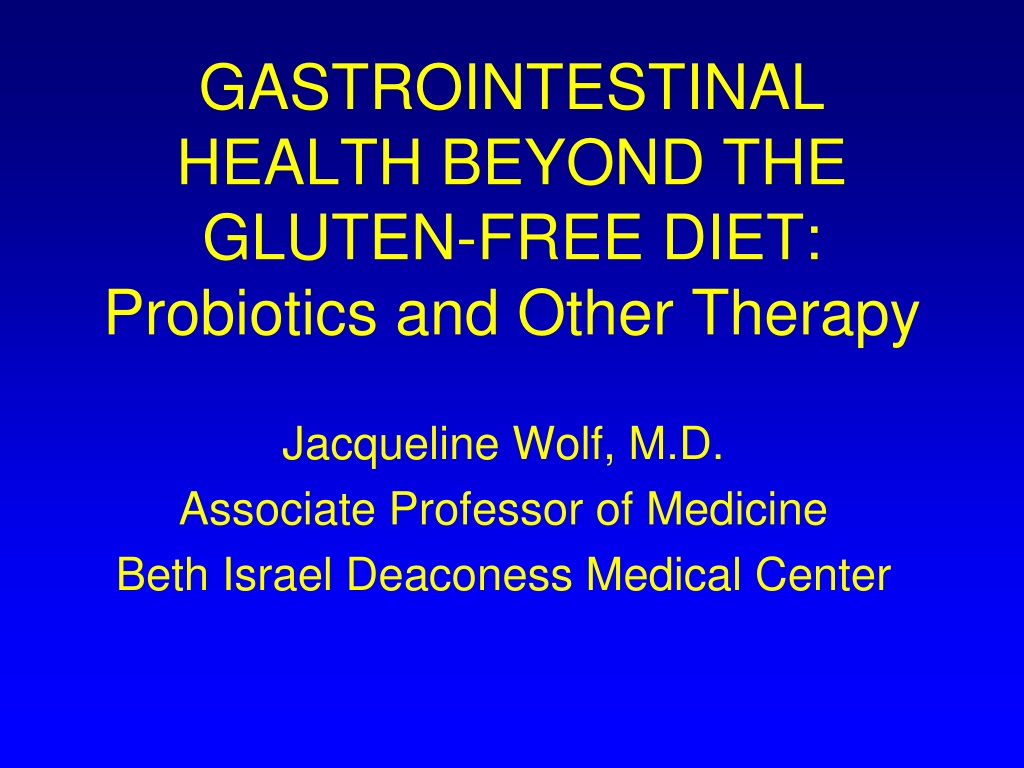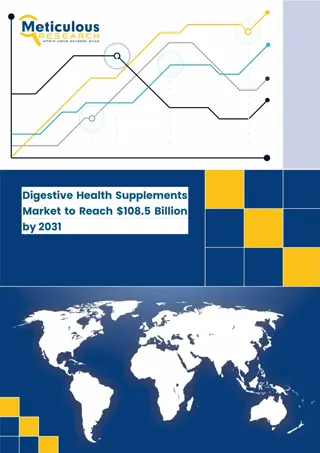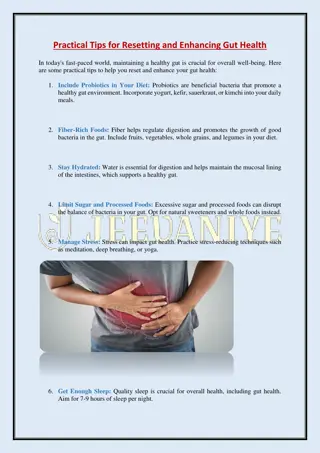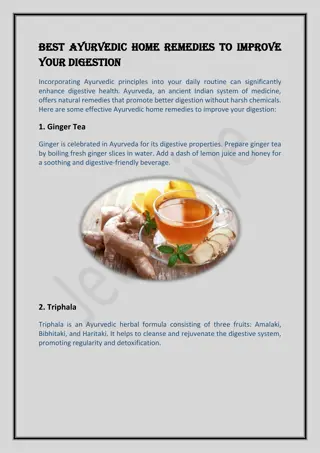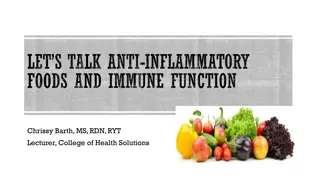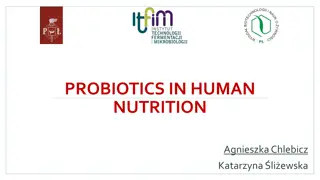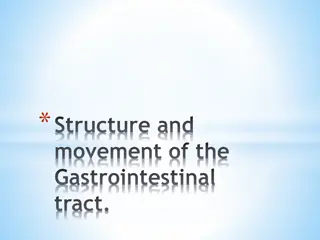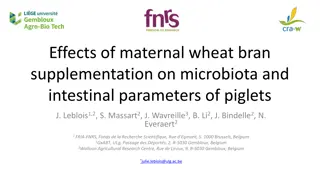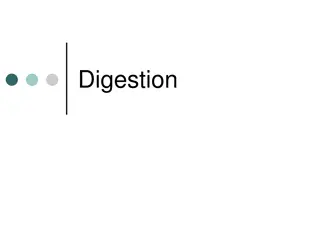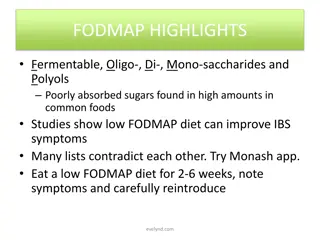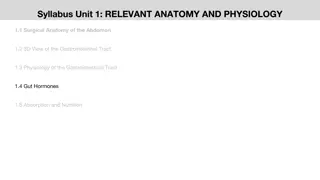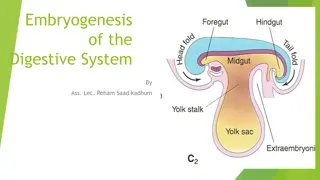Understanding Gut Health and the Role of Probiotics
Gut health plays a crucial role in overall well-being, with a diverse community of bacteria in the gut contributing to digestion, immunity, and metabolic processes. Probiotics, beneficial microorganisms, can help maintain a healthy gut environment. This presentation by Dr. Jacqueline Wolf explores the significance of intestinal bacteria in conditions like Irritable Bowel Syndrome (IBS) and Celiac Disease (CD), highlighting the potential benefits of probiotics and other non-traditional therapies in managing gastrointestinal symptoms.
Download Presentation

Please find below an Image/Link to download the presentation.
The content on the website is provided AS IS for your information and personal use only. It may not be sold, licensed, or shared on other websites without obtaining consent from the author. Download presentation by click this link. If you encounter any issues during the download, it is possible that the publisher has removed the file from their server.
E N D
Presentation Transcript
GASTROINTESTINAL HEALTH BEYOND THE GLUTEN-FREE DIET: Probiotics and Other Therapy Jacqueline Wolf, M.D. Associate Professor of Medicine Beth Israel Deaconess Medical Center
I have no industry or commercial interests to declare that have any application to my presentation
AT THE END OF THIS PRESENTATION YOU SHOULD: Understand some of the roles of intestinal bacteria and how they are altered in irritable bowel disease(IBS) and celiac disease (CD). Understand how probiotics (healthy organisms) may be of benefit in IBS and CD Understand what other non-traditional therapies may be of benefit for gastrointestinal symptoms in IBS and possibly celiac disease
What is normal gut function? Bowel movements 2x/day to 2-3x/week are normal Stool form varies from person to person. In general the stool is usually well formed. Gas occurs in everyone. The amount depends on what you eat (500mL to 1500mL per day) Medications including herbs and over-the-counter medications can sometimes cause constipation, diarrhea or heartburn. Most people have rare heartburn
BACTERIA IN YOUR GUT 1-2 kilograms x body weight Cellular content > 10 fold higher than cells in the body (100,000,000,000,000) Bacterial microbiome (genes) 100 fold > human genome Collective metabolic activity > liver activity Likely > 1000 different bacterial species in the gut Inflamm. Bowel Dis 2004; Science 2005; 308:1635-38; Physiol Rev 2010;90:859-904; Gastroenterology 2014;146:1449-58
BACTERIA IN YOUR GUT What do they do? Produce carbohydrate-active enzymes that digest carbohydrates Break down protein to their component amino acids and then participate in their change to biogenic amines (compounds with another effect on the body), to immunomodulator compounds and to signaling compounds. Produce antimicrobial peptides or bacteriocins that may keep harmful organisms at bay. Make vitamins such as folate and Vitamin B12 Participate in and stimulate the development and function of the immune response Inflamm. Bowel Dis 2004; Science 2005; 308:1635-38; Physiol Rev 2010;90:859-904; Gastroenterology 2014;146:1449-58
BACTERIA IN YOUR GUT ESOPHAGUS (0-102) Limited in diversity Dominated by Streptococcus Increased diversity associated with chronic inflammation and dysplasia STOMACH (0-102) Limited in diversity Helicobacter pylori limits diversity Without H. pylori dominated by Streptococcus SMALL INTESTINE (102duodenum, jejunum; 107-108 distal ileum) Dominated by Streptococcus in duodenum and jejunum Increased number and diversity as you travel down the small bowel to the ileum Gastroenterology 2014;146:1449-1458
BACTERIA IN YOUR GUT LARGE INTESTINE (COLON) (1011-1012) Dominated by phylum Firmicutes (includes Lactobacilli) and phylum Bacteroidetes Next most common Actinobacteria (includes Bifidobacteria) and Verrucomicrobia Diet can change the microbiome Ratio of Firmicutes: Bacteroidetes may determine predisposition to obesity Proteobacteria small proportion in normal individuals but may be increased in people with GI diseases Gastroenterology 2014;146:1449-1458
CELIAC DISEASE AND IRRITABLE BOWEL SYNDROME What is the possible connection? Symptoms of celiac disease and IBS may overlap People with celiac disease may also have IBS Studies show a 4.5% prevalence of celiac disease in people with IBS diagnosed by Rome I or II criteria Systemic review and meta-analysis showed 4 fold increase in IBS compared to non-IBS populations of celiac disease with positive serology and biopsies 3% of people with a clinical presentation of IBS subsequently diagnosed with celiac disease. Reviewed in Verdu EF et al. Am J Gastroenterol 2009. 104(6):1587-94
IRRITABLE BOWEL SYNDROME Can present as: 1. Diarrhea predominant (IBS-D) 2. Constipation predominant (IBS-C) 3. Mixed (alternating pattern of diarrhea and constipation)
IRRITABLE BOWEL SYNDROME Criteria for Diagnosis Rome I >3 months (continuous or recurrent) Rome II >3 months in the last 12 months (does not need to be consecutive) Abdominal pain (continuous or recurrent) in the last year associated with 2 or 3 of the following: Rome III >3 days in the last 3 months (onset at least 6 months prior to diagnosis) Recurrent abdominal pain associated with 2 or more of the following: Timing Criteria Abdominal pain (continuous or recurrent) relieved with defecation or associated with change in stool frequency with 2 of the following at least 25% of days: 1. Improvement with defecation 2. Onset associated with change of stool form 3. Onset associated with change of stool frequency 1. Relieved with defecation 2. Onset associated with change of stool form 3. Onset associated with change of stool consistency 1. Altered stool frequency 2. Altered stool form/passage 3. Passage of mucus 4. Bloating or feeling of abdominal distension
The microbiome (gut bacteria composition) is altered in IBS Bifidobacterium--decreased Lactobacillus-inconsistent findings with some studies showing a decrease and others showing an increase
The microbiome (gut bacteria composition) is altered in Celiac Disease (CD) Reduced concentration of Bifidobacterium spp. in the feces of untreated CD patients and in both active and nonactive CD as compared to healthy people Decreased numbers of Bifidobacterium spp. and increased numbers of Bacteroides spp. In duodenal biopsies of untreated CD Treated CD patients with persistent symptoms vs those without symptoms had higher relative abundance of Proteobacteria and lower numbers of Bacteroidetes and Firmicutes with an overall reduction in microbial richness J Clin Gastroenterol 2013:47;101-103; j Clin Pathol 2009;62:264-9; Am J Gastroenterol 2014:109;1933-1941
WHAT ARE PROBIOTICS Probiotics are living organisms contained in foods, such as yoghurt, and in other supplements in the form of capsules, powder or tablets, which confer a health benefit when administered in adequate amounts. Morelli L. J Clin Gastroenterol 2012;46:S1-S2
Some Probiotics on the Market 27388_582787_1166632032
Some Probiotics on the Market B. lactis Bb12 L. rhamnosus GG L. casei Shirota L. casei L. casei L. reuteri L. johnsonii
PROBIOTICS IN IBS Mechanisms of action Change gut bacterial composition Potentially return abnormal gut flora to normal Competitive interactions with pathogens Produce chemical products, that are toxic to pathogenic bacteria or viruses. Reinforce the mucosal barrier Inhibit the movement of bacteria across the gut wall Produce neurotransmitters that influence the motility and sensation of the gut Produce cytokines, neuroactive peptides, fatty acids, gas and other substances. Reviewed in Gastroenterology 2014; 146 (6)
Probiotics Effective in IBS Probiotic Bifidobacterium animalis Targeted Symptom relief Reduced discomfort and bloating in constipation-predominant IBS Sample Size 274 Weeks 3/6 Bifidobacterium infantis 35624 Reduced abdominal pain and other IBS symptoms 362 4 Bifidobacterium bifidum MIMBb75 IBS symptoms and QOL Alleviated global IBS, improved 122 4 Escherichia coli Nissle Helped in patients with altered enteric microflora, for example, after gastroenterocolitis or use of antibiotics 120 12 Lactobacillus plantarum 299v Improved abdominal pain and bloating 214 4 Reviewed in S.S Magge & J.L Wolf . Women s Health (2013) 9(6), 1-11
Probiotics Effective in IBS Probiotic Targeted Symptom relief Improved QOL, but not significantly in individual symptoms Sample Size 67 Weeks Saccharomyces boulardii 4 Lactobacillus Acidophilus NCFM Improved bloating 60 4 Bifidobacterium lactis Bi-07 Improved bloating 60 4 Lactobacillus Rhamnosus GG Reduced frequency and severity of abdominal pain in children 50 6 Lactobacillus acidophilus Reduced abdominal pain 40 4 VSL#3 colonic transit Reduced flatulence and retarded 48 4/8 Reviewed in S.S Magge & J.L Wolf . Women s Health (2013) 9(6), 1-11
PROBIOTICS IN CELIAC DISEASE VSL#3 (but not 3 other probiotics) reduced the toxicity of gluten when used in a fermentation process Bifidobacterial strains produced less toxic gliadin peptides in vitro Saccharomyces boulardii KK1 degraded part of the - gliadin. In gluten sensitized mice KK1 decreased the IgA transporter (CD71) and improved the small bowel abnormalities and local cytokines (accelerated hair loss with DC412) Bifidobacterium infantis Natren Live Start Super Strain did not improve intestinal permeability, but did improve Gastrointestinal Symptoms and a macrophage inflammatory cytokine, but not other inflammatory markers (# 12 CD; 10 controls) Biochimica et Biophysica Acta 2006; 1762:80-93; Laboratory Investigation 2012;92:625-635J Clin Gastroenterol 2013:47;101-103;
Mouse Model for Celiac Disease: Treatment with probiotics Gluten Diet (G+) Sacrifice D7 D1 D37 G-mice Every Day Every 3 days Oral delivery of KK1 or DC205 or DC412 or PBS Laboratory Investigation 2012;92:625-635
Mouse Model for Celiac Disease: Treatment with probiotics Villous:crypt ratio G- No gluten G+ With gluten KK1 Saccharomyces boulardii DC205, DC412 Lactobacillus paracasei *P<0.05 G + to G-, #P<0.05 KK1 to G+ * * * # * Laboratory Investigation 2012;92:625-635
Mouse Model for Celiac Disease: Treatment with probiotics Positive Cell number * # * * * * * * * *** # * * # * * * ** * * * * * * ** *P<0.05 G + to G-, #P<0.05 KK1 to G+ Laboratory Investigation 2012;92:625-635
Treatment of Celiac Disease with Bifidobacterium infantis Probiotic Arm (#) Baseline Final Placebo Arm (#) Baseline Syndromes Final Indigestion 4.6) 4.3 (3.4-5.3) 2.9 (2.1-3.7)* 4.0 (2.7-5.3) 3.6 (2.6- Diarrhea 2.3)* 3.3 (2.0-4.7) 2.7 (1.6-3.8) 2.9 (1.7-4.0) 1.6 (0.9- Constipation 3.7) 3.6 (2.2-5.0) 2.5 (1.4-3.5)^ 2.7 (1.5-3.9) 2.4 (1.0- GERD Not Significant Not Significant Abdominal Pain Not Significant Not Significant Composite Score Final/baseline ratio *P <0.005, ^P<0.05 Not Significant Not Significant E. Smecuol et al. J Clin Gastroenterol 2013:47;139-147
Herbal medicines shown to be effective in IBS Herbal medicines use plant extracts to treat different symptoms and diseases. For effective results the herbs can be used either individually, as a mixture of different herbs or in combination with western medication. Herbal Medicine Study (Wks) Targeted Symptom Relief Length of Chinese Herbs Improved IBS global symptoms 16 Padma Lax Improved constipation, abdominal pain, abdominal distension and flatulence 12 Tong Xie Yao Fang Decrease in activated mast cells present in IBS 4 STW5,STW5II,placebo STW 5/placebo (315) Reduced abdominal painand IBS symptoms Decreased gastrointestinal symptom score 4 8 Reviewed in S.S Magge and J.L Wolf. Women s Health (2013) 9(6), 1-11
The truth about gas When carbohydrates and fat within our food aren t broken down by the enzymes our bodies make and are not absorbed by the intestines into our bodies, bacteria found in our bowels metabolize them and form gas as a by-product. Depending on the type of bacteria residing in your gut and what food you eat, different gases and therefore different odors will be released. Gas is often a byproduct of what we eat.
TREATMENT OF GAS AND BLOATING Peppermint oil Simethicone-changes the surface characteristics of the gas bubbles making it easier to pass Activated charcoal-adsorbs the gas. However, it can interfere with medication absorption
Peppermint Oil: Treatment for Gas and Bloating A cross between watermint and spearmint Menthol is thought to be the active component causing calcium-channel blocking activity The blockage of calcium flow into smooth muscle in the intestine decreases muscle contractions thereby reducing pain Adverse effects include heartburn, skin rash, perianal burning, bradycardia and muscle tremor. Reviewed in S.S Magge and J.L Wolf .Women s Health (2013) 9(6), 1-11
Peppermint Oil in IBS Study Size Targeted Relief Symptom Sample Meta-analysis of 8 Trials-5 dble blind Significant improvement of IBS symptoms Randomized, Double-blind placebo stool frequency and flatulence Controlled study-4wks Reduced abdominal distension,, 110 2007 Double-blind study 4 weeks 75%PO vs 38%PL >50% reduction in IBS symptoms 57IBS Reviewed in S.S Magge and J.L Wolf .Women s Health (2013) 9(6), 1-11
Acupuncture not shown to be effective in IBS Acupuncture is based on a life force qi that runs through the body in channels called meridians Disruptions in qi result in disease processes, which can be corrected at the exact anatomical locations using acupuncture Study Real vs Sham acupuncture vs no treatment Cochran review-17 random- Many poor quality. Ized clinical trials Results Sample Size/wks No significant difference in IBS symptoms sham vs real but better than no treatment 230/3 wks 1806/variable Variable results.Same as Bifidobacteria, psychotherapy Reviewed in S. S Magge et al. Women s Health 2013. 9(6):1-11
SUMMARY The gut contains numerous bacteria The bacteria differ in people with Irritable Bowel Syndrome (IBS) and Celiac disease (CD) from healthy individuals without those conditions. Some probiotics have been shown to improve symptoms of patients with IBS Some probiotics make gluten less toxic to patients with CD, but to date in people in contrast to animals there are no trials showing benefit. Some herbal compounds help IBS patients Peppermint oil may help bloating and gas Acupuncture has not shown benefit in IBS
